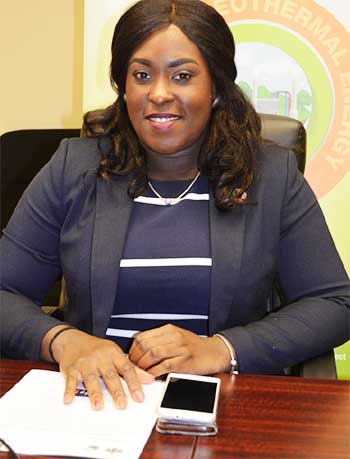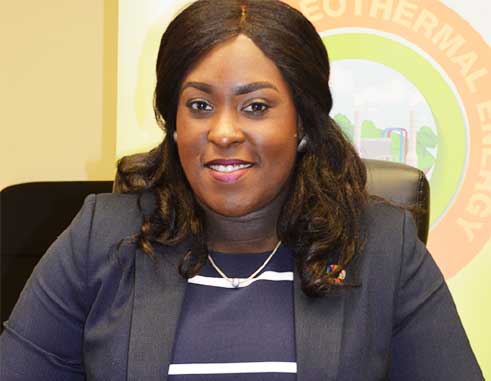
PRESS RELEASE – Ms. Charlin Bodley, Energy Officer within the Energy Division of the Department of Infrastructure, Ports and Energy has just completed a 6- month fellowship training in Geothermal Project Management and Financing in Iceland. The United Nations University (UNU-GTP) postgraduate course is designed to assist developing countries with significant geothermal potential to strengthen technical and professional capacity in that area. The UNU-GTP is highly reputed for its specialized training in all the main fields of geothermal science and engineering. Its graduates span the Americas, the African, Asian and European continents and rank among the leading specialists in geothermal research and development in their respective regions.
During a media briefing on Friday November 9th, Ms. Bodley disclosed that an important aim of the course is to establish groups of specialists in geothermal exploration and development with the basic knowledge necessary for sustainable geothermal development. “It is a very intensive programme during which we worked alongside geothermal professionals in the Iceland. A valuable aspect of the training is that methodologies are specifically tailored to the needs of the institutions and countries we represent, based on our renewable energy focus, priorities and stages of resource development,” Ms. Bodley reported.
Iceland is reputed as a pioneer in the use of geothermal energy for space heating, while. Geothermal power facilities currently generate 25% of the country’s total electricity production.
According to Deputy Permanent Secretary in the Department of Infrastructure, Ports and Energy, Mr. Barrymore Felicien, professional development and opportunities for specialization in renewable energy development is strategic to the implementation of the National Energy Transition Strategy (NETS) which Cabinet endorsed in April 2018. The NETS is a roadmap for achieving greater renewable energy penetration within Saint Lucia’s energy mix while pursuing energy efficiency. “It is also necessary for Saint Lucia’s overall renewable energy sector development agenda. Typically, developing countries are forced to look outside for some of the competences required, because these fields call for unique specializations. With in-country specialists, apart from the accessibility of related skillsets, we are assured of value-added benefits such as knowledge transfer,” Mr. Felicien added.
Saint Lucia is aggressively pursuing an agenda towards reducing Saint Lucia’s dependence on fossil fuels for energy generation. The most recent target set by the Nationally Determined Contributions (NDCs) is a 35% renewable energy target by 2025 and 50% by 2030 by increasing renewable energy penetration. Geothermal is one of the pathways being considered to achieve these targets. The others are solar, wind and battery storage.
Last year Government resumed upstream activities ahead of geothermal exploration. Pre-Feasibility studies and an Environmental and Social Impact Assessment were concluded with plans on track for the commencement of exploration activities to determine the commercial potential of the geothermal resource at Fond St. Jacques and Belle Plaine in Soufriere and at Saltibus in Choiseul. This year LUCELEC commissioned the island’s first utility scale 3 MW (15,000 panel) solar farm. At an annual 7 million kilowatt-hours capacity, it contributes about 1.3% of electricity generated from the Cul De Sac Power Plant, and will reduce LUCELEC’s annual volume of fuel purchased (19 million) by 300,000 gallons.





![Simón Bolívar - Liberator of the Americas [Photo credit: Venezuelan Embassy]](https://thevoiceslu.com/wp-content/uploads/2025/12/Simon-Bolivar-feat-2-380x250.jpg)



